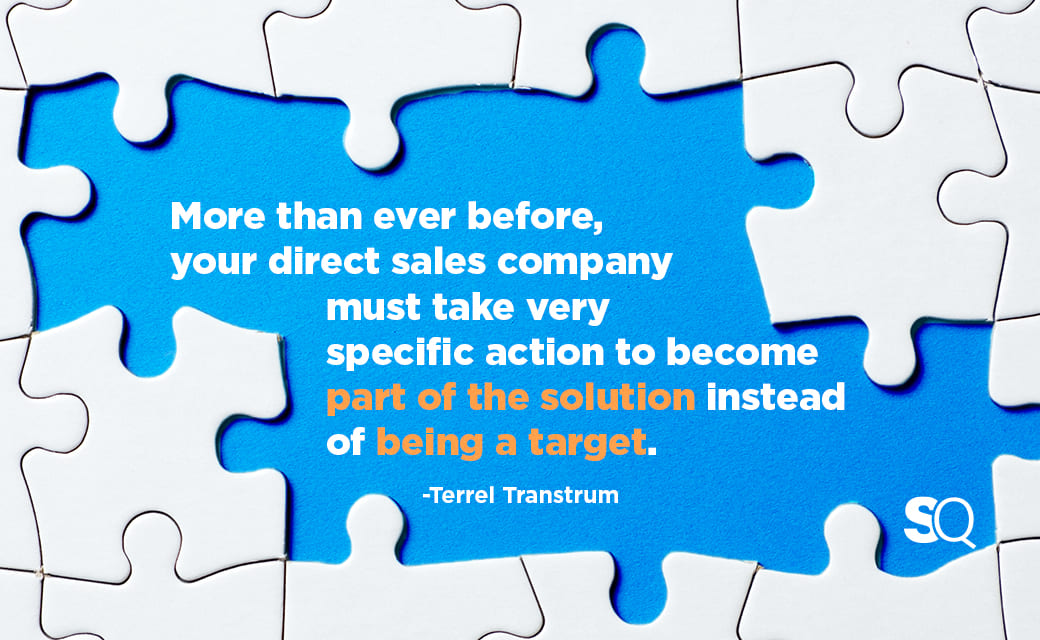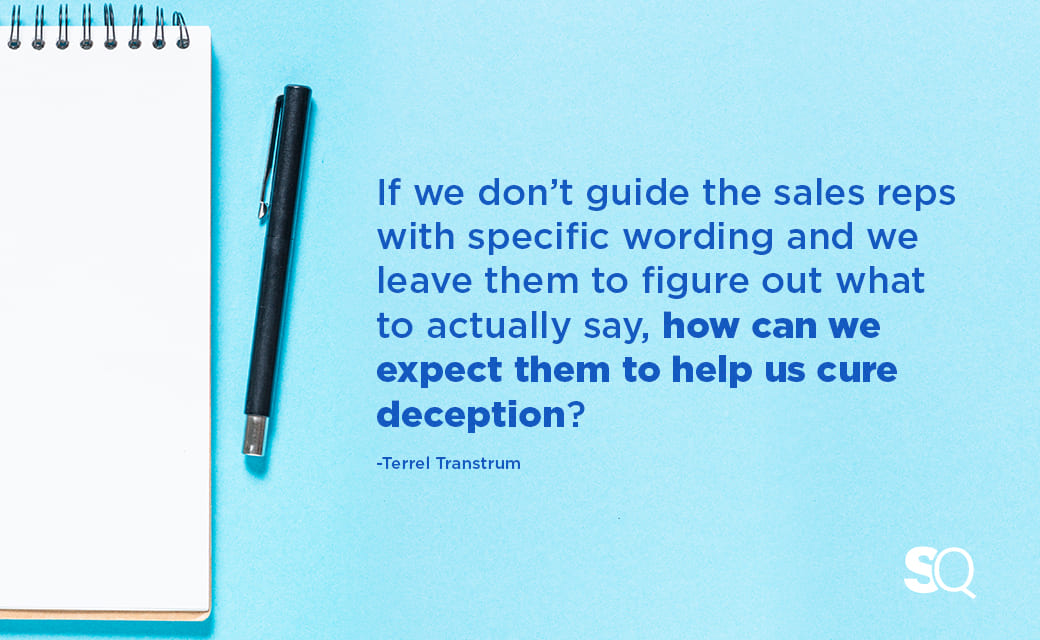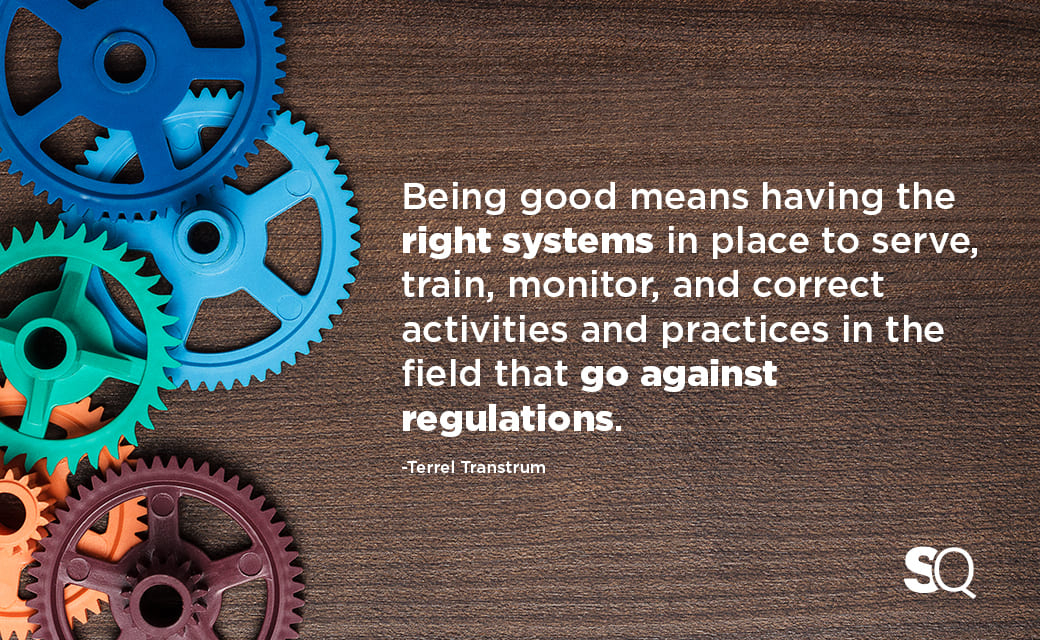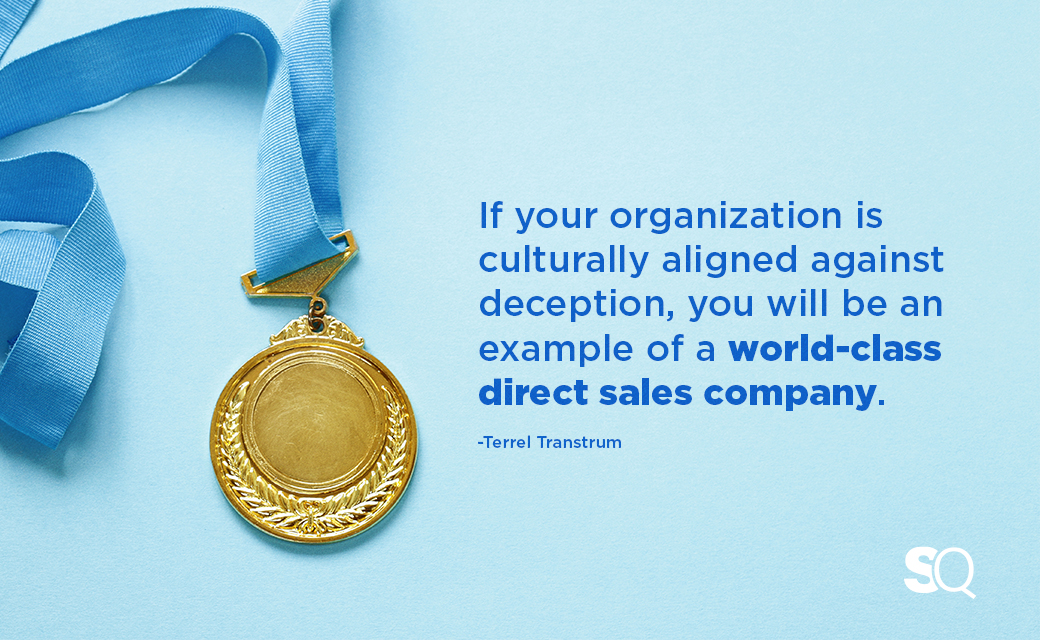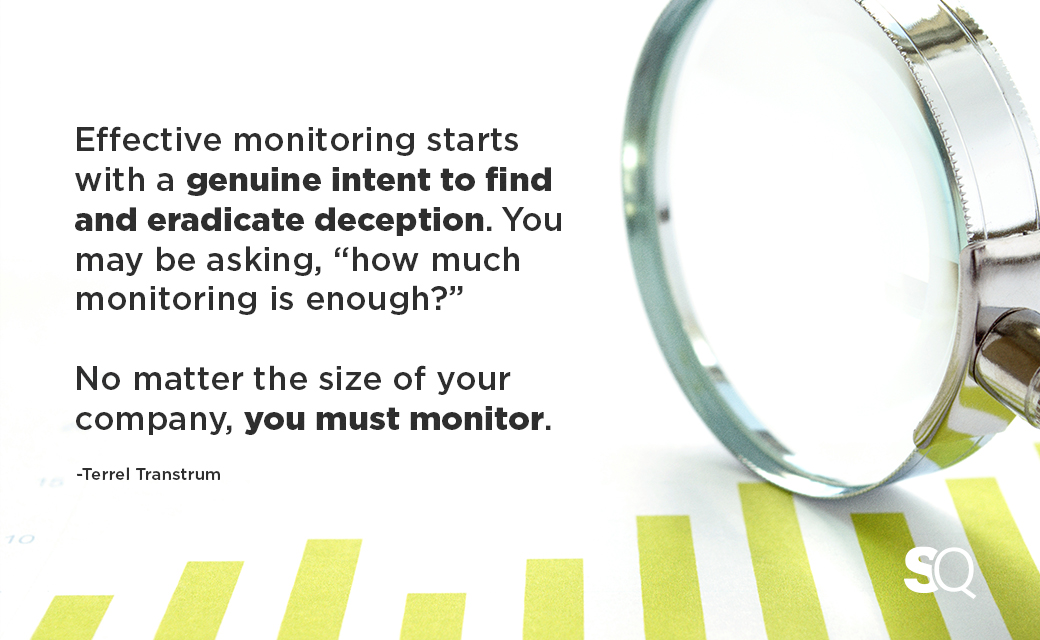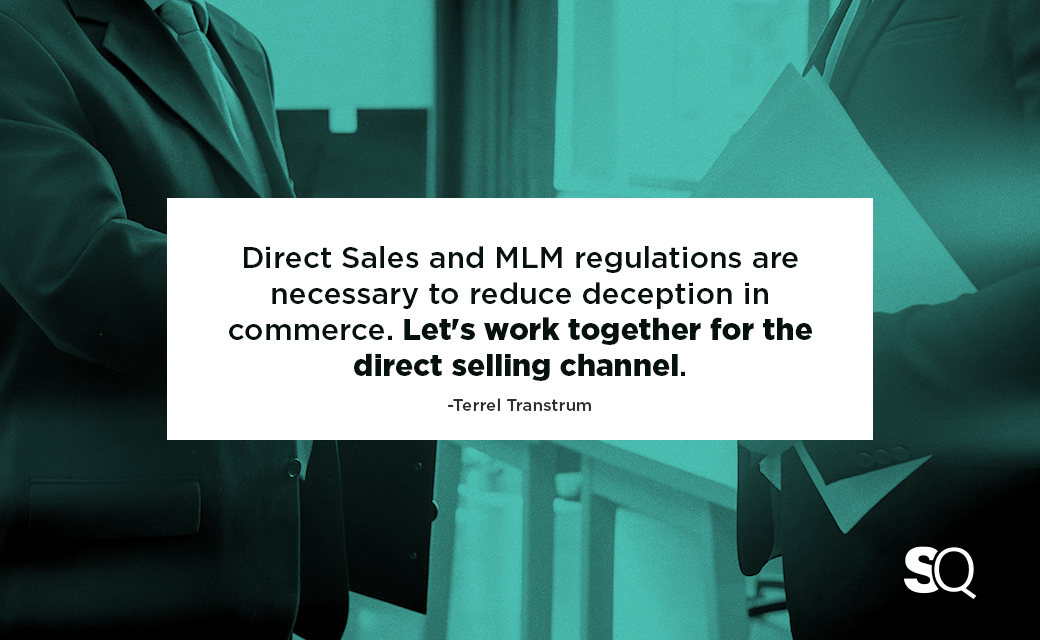Ready for the Regulators: A Powerful Approach to the New MLM Regulatory Normal
MLM Regulators: The Sonar-Guided Rodent
With the new MLM regulatory enforcement, direct sales owners and executives have become John Candy (as Chet Ripley) and Dan Akroyd (as Roman Craig) in the 1988 comedy film, The Great Outdoors. You may remember the bat scene.
A furious rainstorm forces the two families into Ripley’s cabin. An unlucky bat is stranded. Ripley and Craig attempt to take down the “sonar-guided rodent.” However, the frenzy and uncertainty of their blind swings destroy the living room instead. As the family stands outside cheering, Craig swings one last time. But this time Ripley takes the tennis racquet to the face where the bat has landed.
TINA.org (Truth in Advertising) is the regulatory “sonar-guided rodent.” They are flying around the offices of MLM companies across the United States, striking fear and uncertainty as they search the Internet for problematic claims and representations by distributors building their MLM business.
TINA’s mission is to promote truth in advertising and protect against deceptive marketing. Their purpose is aligned with state and federal consumer protection agencies. TINA.org sets a standard that an MLM or network marketing company can confidently achieve.
When this “sonar-guided rodent” flies into your MLM company, you can be prepared. TINA.org is looking for deception practices. With smart MLM sales & business compensation structure and field training, you can quickly remove the bat when it flies in—no tennis racquet required!
Be the Solution, Not the MLM Regulatory Target
More than ever before, your direct sales company must take very specific action to become a solution instead of being a target. Targeted MLM companies are those that permit—unwittingly or otherwise—the use of deceptive business opportunities and false health claims.
I’ve spent 30+ years with the best MLM Companies and Direct Selling Enterprises in the world. In that time, I’ve learned every good thing has an evil twin. I believe the best of commerce and participants’ personal growth happens in direct sales or MLM. Unfortunately, the scams and scammers use the direct sales business model in destructive ways. They hurt people and consumers. They destroy dreamers, embarrass communities, and kill the good companies. Scammers have stained the reputation of direct sales.
The List
On June 30, 2021, TINA.org released a letter to the FTC. It contained a list of 660 multi-level marketing companies with contact information “to assist the FTC in providing notice.” I’ve studied that list. And most on that list, I believe to be good companies, operated by good people for good purposes. Your name may be listed as you once again fight to protect your distributors and your good name.
The latest efforts of the TINA.org organization explore how the FTC can obtain civil penalties, and therefore money, through novel enforcement methods. Noteworthy: the FTC has signaled it may seek to amend the Business Opportunity Rule to cover direct sellers and others in the “gig economy.” The takeaway here seems clear. Even as the battle in Congress to pass legislation continues, the FTC and others continue pressing new methods to obtain money through enforcement.[1]
It’s the good companies that give us insights and recommendations. This powerful and practical approach to the new regulatory normal is based on common sense, lots of experience, and a bright outlook that good will always prevail. So, if you are committed to doing good, read on.
Doing Good and Being Good
To be the solution you must do two things: do good and be good.
Doing Good
Doing good means aligning against deception. That is, you must operate your enterprise around true customer-centricity.
In my debut as a young executive in a multi-level marketing company, my billionaire mentor told me on my first day at the office, “Terrel, your job is to keep our customers and distributors happy.”
He continued, “You will report directly to me. I want no filters between the CEO and the field. You will be the highest-ranking employee on our team. Everybody needs to know that they must keep you happy. That’s because your job is to keep our customers and their distributors happy.”
That company, and many others, truly focused their efforts on the customer—even above goods or services. They structured the retail sales, marketing program, management team, and operational design around finding and keeping happy customers.
That magnificent company is now nearly $3 billion in annual revenues. Below is clear insight on what they do differently to continue to claim moral high ground and the right to sell:
-
No incentive for upline distributors to press consumers to buy more products than they need.
Your program rewards say exactly what you value. The compensation structure stated orders totaling more than $100 in a month receive a 25% rebate to the customer. Therefore, commission volume over $100 is removed from compensation calculations.
-
Reasonable ordering minimums trigger price reductions.
In exchange for ongoing customer loyalty, the lowest possible prices are available to all. Based on the wide mix of available products, the threshold monthly minimum is basically $35. Notwithstanding this low monthly threshold, it’s interesting to note that the average monthly order size hovers just under $80 because of the mix and value of the products. In other words, customers choose to spend more than double the required minimum to qualify for the lowest-price option.
-
Customer-first service environment.
They implemented a customer satisfaction program designed around the “happy customer” blueprint. When you provide products and services that deliver value and create a valued relationship, customers come back again and again. After all, the purpose of business is “to create and keep a customer.”[2]
-
Policies to protect the customer, the participants who bring customers, and the company.
Everyone must work together to protect the business’s reputation. Policy administration presents a world-class opportunity to take good care of customers. In addition, you gain consistency no matter who handles a policy issue. My most joyful work is in training customer service agents in a modified version of a method I learned in first-year law school called IRAC—Issue Rule Application Conclusion.[3]
-
Training, monitoring, and effectively correcting, when necessary, those who receive compensation from your company.
If a distributor uses deceptive language, they don’t align with your company. We believed in second chances. At the same time, we must be unrelenting in our effort to cure deception.
The seven elements that I describe in the next section permanently cure deception in your company. However, you must go beyond lightweight strategies to prove “internal consumption,” “actual sales,” or “ratios of distributors to consumers.”[4]
What can your salesforce say?
It’s hard to find someone in a position of authority who will say what a company can do. I recently conducted a study of 10 high-profile direct sales companies. The goal was to identify the practices for teaching field teams what they CAN say about earnings (and products), and not just what they CAN’T say.
I looked at their income disclosure statements to evaluate actual training methods and content for my research. I specifically searched for wording and phrasing that would serve as a guide.
Here is what I found:
1.Somewhat to my surprise, the 10 companies categorically avoid providing training sales reps what they can say.
Not one of these ten companies will “poke their head up” to face the “sonar-guided rodent.” Yet it is equally clear there is a need to do so. An unclear communication strategy with ineffective training will lead sales reps to slip into exaggeration in order to close a recruit and make a sale.
2. Standards for responsibility to train run the gamut.
I saw distributor-mandated training—without company resources. In other cases, companies used starter kit-based materials. And some had compensation plan training with mild reference to avoiding illegal income claims, and live local training, when possible.
3.Content centers on caution and the use of Income Disclosure Statements.
“When in doubt, leave it out” applies here. As distributors explain their compensation, the use of income disclosure statements becomes paramount.
Train What They Should Do
Here is what I recommend and implement for clients:
1. Identify and train three key guidelines for all sales reps:
- If they discuss income numbers or lifestyle achieved, base it on documented facts.
- Always use the Income Disclosure Statement. In this way, you fulfill the requirement to disclose the generally expected or average result when talking about above-average earnings.
- Talk about the success that may be possible through sound business and sales skills. This includes hard work, commitment, patience, and perseverance.
2. Disclose the generally expected result or average earnings. You can craft a simple, universal phrase for the sales reps to use. Reference the company’s annual Income Disclosure Statement. Compensation depends on participants’ actual sales. And no amount of success is ever easy or guaranteed.
3. Teach a simple phrase that incorporates the basics. Discuss this with your legal counsel. However, start the discussion with this premise: “If we don’t guide the sales reps with specific wording and we leave them to figure out what to actually say, how can we expect them to help us cure deception?”
4. The following example is a 45-second script showing how this portion of compliance training might flow for the new sales rep:
POSSIBLE SCRIPTED SECTION IN COMPLIANCE CERTIFICATION TRAINING:
We talk about income as an important aspect of our business. Someone deciding whether it’s worth their time and risk to join in the journey will want to know how it will affect their future.
Let’s face it. The ultimate question in the mind of a hopeful sales rep is: “how will this benefit me?”
As with any business venture, we do not guarantee any income. Success depends on your effort, commitment, leadership abilities, and how effectively you exercise these qualities and build yourself through experience and training. An income claim other than average earnings in the company is considered deceptive by the FTC.
If you talk about amounts earned by other people who are advancing in their ranks, be sure to share the company’s Annual Income Chart. This earnings disclaimer chart demonstrates the average earnings of sales reps at each rank.
Here is how you can safely talk about income:
Don’t mention your check amount: “I achieved the Level I director rank in six weeks.”
Disclaimer Language: “My check after achieving Level I director rank was $892 but it’s important to know that this isn’t the average. When we talk about income potential, we share this income disclosure statement with you to help you see the averages.”
The current regulatory system is designed to keep you swinging at “sonar-guided rodents” as you try to guess what will work and what will not work to remove deception at an acceptable level and in acceptable ways. It is time to lead your company into the battle of curing deception and not shy away from regulators.
Being Good
In discussing the Federal Trade Commission’s litigation strategy, Mr. James Kohm, in his former role as Acting Director of the FTC’s Bureau of Consumer Protection, is quoted saying, “We want to put bad actors out of business as quickly as possible with a minimum outlay of federal resources.” If you’re a bad actor, they’re coming for you—and they should. My advice is for the “good actors” or those who want to be “good actors.”
Being good means having the right systems in place to serve, train, monitor, and correct activities and practices in the field that go against regulations. It’s much more than “compliance.”
Since the purpose behind the regulations is to prevent deception, then the solution is to cure deception in your organization. From the perspective of the regulators, the actions and words of your salesforce distributors are the actions and words of your company.
If your organization is culturally aligned against deception, you will be an example of a world-class direct sales company. You’ll be known as an organization that makes a difference for consumers, distributors, employees, and stakeholders at all levels. You will not only escape the fatal bites of the bats but you will also be able to expend your energy and expertise on building the business instead of fighting off the federal trade commission.
Deception is easily cured.
From my experience, backed by the views and recommendations of my direct sales attorney colleagues,[5] the seven elements of the deception cure are these:
1. Commit.
Make the commitment to genuinely cure deception. Blend the commitment into your culture. You are not required to make it the main event of all that you do. But with the right motives guiding the practices your refinements will reflect your commitment to curing deception in MLM companies.
2. Clean House.
Either you can clean it or the regulators will eventually send their cleaning crews. You want a clean house without their involvement.
Review your company’s literature and remove overt or nuanced deception.
Eliminate the signals that would indicate that deception (or perhaps “mild” deception) is okay, “wink wink.” It’s not okay.
Using the same monitoring tools that the regulators use, comb the Internet for all forms of media that contain deception about income and products.[6]
Make a clean break from the “wink-wink, nudge-nudge” approach to compliance and send the signals that this is not okay.
3. Set up an effective MLM regulatory compliance system.
With processes and trained personnel, your system will support a compliance initiative while informing executives, staff, and the field for ongoing training. Document your company’s legitimate activities to be part of the solution to cure deception rather than a target for the regulators.
4. Work together.
Engage with your salesforce, your front-line customer service agents, and your compliance team and work together. Set expectations, clarify the standards, then train, monitor, remediate, and train some more!
At a minimum, help your sales reps understand their obligations under the law, and train them in how to fulfill these obligations. Done right, it will both help with compliance while supercharging growth. This is because the kind of consumer you want in your business will always recognize goodness.
An excerpt of a video dialogue we created for one of our clients to use in their online compliance training relates to a product discussion looks like this:
Depression is an illness. When discussing any of our products, stay away from anything that refers to an illness, disorder, disease, or even anything that may be associated with one. For example, using terms like “inflammation” or “anxiety” may lead someone to believe the product will treat their illness because these are terms often related to disease or disorder
Try this compliant alternative instead: “I’m so glad I started taking WooHoo!™ It’s helped to reduce feelings of anxiety and improve my mood.” In this example, we’re referring to everyday feelings of anxiety that many people experience rather than anxiety as a disorder.
The point is that by working together with the field and providing specific phrases along with the training, you can make great strides to cure deception.
Training: We have a client that takes the following approach to training the brand-new rep on arrival:
“Welcome to our company! To activate your account, click here and complete a simple training designed to help you get started on the right foot.”
The company has a 99% completion rate of the front-door compliance training, where they introduce the new rep to their responsibilities, starting with the importance of talking about income and products in acceptable ways. This creates a foundation on which to build healthy and immediate compliance dialogue and effective remediation when a rep crosses the line.
Train your customer service and compliance teams to tame their zeal for finding and punishing offenders. Give reps all the respect and kindness they deserve. Strive to help them be successful by pointing out the behaviors that are not acceptable. Obtain commitments to learn how to do it right. Keeping good records will permit proper escalation through a process designed to cure deception and correct wrong behaviors instead of finding sport in terminating distributors. When termination becomes necessary, you are fully documented for liability purposes as well as for regulatory proof.
Remediation: An effective step in remediation can include one or more courses designed to train and reinforce responsibilities and acceptable behaviors. Think of driving school: the driver is required to complete classroom time and watch the movies of gory automobile accidents.
Income disclosure documents are important as part of the cure, but training sales reps on what to say in their conversations and how to properly explain averages will reach much deeper into curing deception.
Product claims will always remain in check when your literature and labeling meet the requirements while still being highly effective in delivering the marketing message. When you train the sales organization to rely on and only use approved literature and you provide them with motivation to do so, you will find your company in safer waters. The great news is that you do not need to sacrifice effective messaging of your brand and products. In fact, when you clarify your brand and the true underlying benefits, the need for exaggeration goes away.
5. Monitor.
Monitoring can take many forms. There are effective methods and tools to streamline your process. Effective monitoring starts with a genuine intent to find and eradicate deception. You may be asking, “how much monitoring is enough?” No matter the size of your company, you must monitor.
Companies that work with the field can count on the field to report deceptive practices to enhance the company’s internal efforts. Small companies will devote a certain number of hours each week to scanning the Internet, social media sites, and keyword searches. Other companies engage the services of monitoring specialists, some of which provide remediation and case management support. Think as a regulator thinks. Then seek the red flags they are also finding and take appropriate action.
6. Remediation.
Remediation is where the important work takes place. I believe in second chances. A progressive path to getting it right is healthy both for the offender as well as for the company. And when the investigators tap you on the shoulder, you have a properly documented history that shows you are giving much more than lip service.
7. Manage.
Compliance case management is aligned with the common work done by your front-line customer service agents. You should carefully consider using your CRM for notes and case management in the same ways, or at least tie case notes to your automated case management system. The wisest of compliance managers have strong partnerships with customer service who can serve to enhance effectiveness; but they need access to notes. Don’t keep them in the dark.
Compliance managers sometimes think that records must be kept from customer service reps. In reality, the CSRs are top-notch thinkers who manage all kinds of policy issues. Deceptive income and product claims are just more issues to track and solve. Don’t over-complicate this. It’s part of great management of any initiative includes tracking, reporting, and KPIs.
Together, We Can Protect Consumers
Direct Sales and MLM regulations are necessary to reduce deception in commerce. Let’s work together for the direct selling channel. Let’s focus our efforts and strengthen our purpose so that every customer and distributor can benefit from the products we sell and the income we offer.
Instead of swinging at the “sonar-guided rodent,” let’s operate far above the minimum standards of the law. So, when they do come in looking for deception, instead they find us doing good and being good to our customers, our distributors, and our communities. The letter from TINA.org to the FTC is not a problem for those who are operating in the service of others.
Let that be your focus and watch your company grow!

